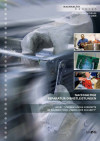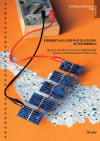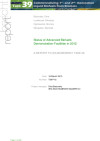Suchergebnisse für "Factsheet: Energietechnologien gestalten, die für alle sinnvoll und nutzbar sind"
Climate Pioneer Districts Graz (KPQ Graz): Preparation of the climate-neutral districts ÖBB Eastern Railway Station and Smart City North-West
The Climate Pioneer Districts Graz (KPQ Graz) project is preparing the development of the districts "ÖBB Eastern Railway Station" and "Smart City North-West" in Graz towards climate neutrality. Based on the lessons learned of the evaluation of the already realised district "Smart City Graz", an innovative district concept is being created for the infrastructure topics of energy, mobility, green/open space and social sustainability. The central goal of the exploration is the subsequent realization of at least one of the two pilot quarters.
Nachhaltige Reparatur-Dienstleistungen

Neue Österreichische Konzepte im Rahmen von "Fabrik der Zukunft"
Forschungsforum
1/2008
Herausgeber: BMVIT
Deutsch, 6 Seiten
Downloads zur Publikation
Climate Quarter Melk
Radical and comprehensive transformation of a city quarter in the small town of Melk, Lower Austria, involving the areas of urban planning, landscape architecture, traffic planning and co-creation - demonstrated by the implementation and rededication of a parking lot to an urban, inner-city climate forest within project life-time.
sewageENERGYrecovery - Performance comparison of different wastewater heat recovery systems for renewable heat generation
Independent detailed testing of the performance and efficiency of different wastewater heat recovery systems in actual operation by analysing measurement data. Evaluation of the analysed systems with regard to their optimal application possibilities.
Fit4Klim - Fit through education for the climate
The aim of the project is to develop and test customised training courses to qualify cities and municipalities in the areas of climate change adaptation and climate protection, spatial planning, green finance, energy and mobility.
SIMPLE AD Evaluator - S.I.M.P.L.E. Sustainable Integration Modeling and Predictive Leveraging Evaluator
The SIMPLE AD Evaluator fills an existing gap in sustainable local planning by providing a low-threshold and collaborative evaluation tool for early planning phases. By linking questionnaires with System Dynamics models, the tool delivers well-founded decision-making foundations and customized sustainability checklists. This supports municipalities, project developers, and decision-makers in achieving a strategic and cost-efficient sustainable transformation from concept to implementation.
Symposium: Plus-Energie-Gebäude
28. November 2011
Prechtlsaal, TU Wien
Wien, AT
Aktuelle Forschungsergebnisse zu Plus-Energie-Gebäuden aus der Programmschiene "Haus der Zukunft Plus"
Verbreitung Der Photovoltaik In Österreich

Der 200-KW-Photovoltaik-Breitentest Soziologische Begleitforschung
Forschungsforum
2/1998
Herausgeber: BMVIT
Deutsch, 6 Seiten
Downloads zur Publikation
Kontakt
Konferenz: 2. Puchberger Wirbelschichttreffen
19. Oct 2009 -
20. Oct 2009
Puchberg am Schneeberg , AT
Vom 19. - 20. Oktober 2009 findet in Puchberg am Schneeberg (NÖ) das 2. Puchberger Wirbelschichttreffenstatt. Das Treffen dient vor allem dem direkten Erfahrungsaustausch und der Weiterentwicklung der Wirbelschichttechnologie.
Status of Advanced Biofuels Demonstration Facilities in 2012

Der Bericht gibt einen Überblick über den Stand der Technik der Umwandlungstechnologien von Biomasse zu fortgeschrittenen Biotreibstoffen und stellt eine Ergänzung zu der vorhandenen Demonstrationsanlagen-Datenbank dar.
Herausgeber: IEA Bioenergy Task 39, BIOENERGY 2020+
Englisch, 209 Seiten
Downloads zur Publikation
Performance Evaluation of Lighting and Daylighting Retrofits: Results from IEA SHC Task 50

Erste Ergebnisse aus den Fallstudien zu Beleuchtungssanierungen in Nicht-Wohngebäuden im Rahmen des Subtask D "Case Studies" des IEA SHC Task 50 wurden auf der SHC 2015, der International Conference on Solar Heating and Cooling for Buildings and Industry, vorgestellt.
Marie-Claude Dubois, Niko Gentile, Claudia Naves, David Amorim, Werner Osterhaus, Sophie Stoffer, Roman Jakobiak, David Geisler-Moroder, Barbara Matusiak, Fredrik Martens Onarheim, Eino Tetri
Herausgeber: Elsevier, Energy Procedia, SHC 2015, International Conference on Solar Heating and Cooling for Buildings and Industry, Istanbul
Englisch, 10 Seiten
Downloads zur Publikation
IEA-DSM Spotlight-Newsletter #64, März 2017

Der Themenfokus des Newsletter liegt auf dem Nutzen von Verhaltensänderungen, der Wirtschaftlichkeit von Gebäudenachrüstungen sowie der Schweizer Energiestrategie 2050
Herausgeber: IEA DSM
Englisch, 7 Seiten
Downloads zur Publikation
NEBKrit - Quality criteria for buildings and neighbourhoods on the basis of the New European Bauhaus
Develop criteria of aesthetics and social inclusion based on the values of the New European Bauhaus to complement existing sustainability criteria in order to evaluate buildings and neighbourhoods more broadly. Since todayʼs necessary transformation of the economy always includes cultural and social aspects, such a broader assessment makes more sense than todayʼs usual methods.
P2PQ - Peer2Peer im Quartier

Das Projekt Peer2Peer im Quartier befasst sich mit der konkreten Umsetzung von Anwendungen zu Photovoltaik-Eigenverbrauchsoptimierung sowie Peer-to-Peer-Beziehungen auf Basis der Blockchain-Technologie in Quartieren und deren Validierung im Echtbetrieb.
Schriftenreihe
26/2022
Herausgeber: BMK
Deutsch, 43 Seiten
Downloads zur Publikation
ReSpace – Reclaiming Spaces
ReSpace is developing an AI-based model for identifying, categorizing, and activating sealed areas. Existing data sources (aerial and satellite images, mobile network data, land registry entries) are integrated and enhanced with dynamic analysis to derive evidence-based recommendations for action.
Topview - Methodology for the efficient use of remote sensing data for climate change adaptation and spatial energy planning
Development of integrated approaches to sustainable energy and heat planning in urban areas by utilising remote sensing data and geo-information-based technologies for decision-making in the planning of energy infrastructures and climate adaptation measures.
GREEN Stone: development of a cement-free concrete with recycled content for applications in landscaping
The Green Stone project aims to develop geopolymer concrete with recycled materials in order to reduce the consumption of non-renewable resources and replace the cement content with alternative binders. The landscaping industry in particular requires lightweight, durable and weather-resistant materials.
LifeCycle Tower auf dem ERSCP2012
Auf dem European Round Table for Sustainable Consumption and Production 2012 stellte Michael Zangerl von Cree das Baukonzept des LifeCycle Towers in Rahmen der "Battle of Towers" vor. Eine Exkursion führte zum "Haus der Zukunft Plus"-Demonstrationsgebäude, das in Modulbauweise errichtet wird.
Film "Bauen mit Hausverstand - Das Haus der Zukunft"

Dokumentation über ambitionierte Pilotprojekte vom ersten Spatenstich bis zur Fertigstellung
Mehrsprachig
